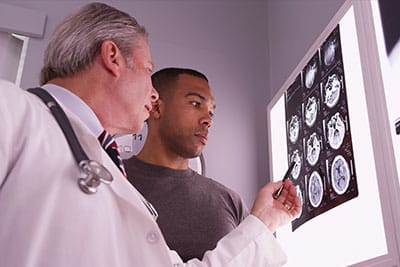Biomarkers could guide TBI diagnosis and treatment
A new study is examining a method to improve the diagnosis and treatment of traumatic brain injuries.

A recent study is currently focusing on using biomarkers to help in diagnosis and treatment of traumatic brain injuries. Biomarkers are defined as medical signs that can be accurately measured by medical professionals. The National Institute of Health distinguishes medical signs from medical symptoms, noting symptoms are limited to those perceived by the patients themselves while signs can be measured.
In this study, signs that were measured included various movements of the eyes, muscles within the neck and sensory cells in the ear. If successful, the findings of this study could lead to more accurate traumatic brain injury diagnosis and treatment.
What exactly are traumatic brain injuries?
A traumatic brain injury (TBI) is defined by the National Institute of Neurological Disorders and Stroke as a form of brain injury that occurs when a sudden trauma causes damage to the brain. Symptoms of TBIs can include dizziness, headache, confusion, lightheadedness, blurred vision, behavioral or mood changes, or trouble with concentration or memory. More severe cases can include vomiting, dilation of pupils, slurred speech, loss of coordination and agitation.
What causes these injuries?
The medical professionals with Mayo Clinic state that TBIs are most often caused by the following:
- Car crashes
- Sports injuries
- Falls
- Explosive blasts and combat injuries
The severity of the injury depends on a number of factors, including the force of the impact.
What can be done to treat these injuries?
There is no cure for traumatic brain injuries. However, medical professionals can help to stabilize those who suffer from these injuries and prevent future injuries. This can include monitoring oxygen supply and blood flow, running imaging tests and x-rays as well as starting a rehabilitation plan.
The study noted above is focused on conducting tests that help to tailor rehabilitation plans to the patient’s specific needs. A recent article in Medical Xpress discussed the study, noting the exams used included tests that measure eye coordination and alignment, visual acuity and ocular health. Essentially, the tests are examining the vestibular-ocular reflex, or the ability of the body to keep images still while the body is in motion. A common example is the ability to read a street sign while walking. Although the body is in motion while walking, the sign appears stable. In some TBI victims, the vestibular-ocular reflex may be impacted. This can lead to issues with headaches, nausea and balance.
Why should I hire a lawyer?
Victims who suffer from a TBI connected to a car accident or other negligent or reckless act can hold those responsible for the injury liable. Holding these individuals liable can help cover the costs associated with the injury. This could include the costs for testing, treatments and medications. An experienced personal injury lawyer can review the details of your claim and build a case to help better protect your legal rights and any potential remedies.

